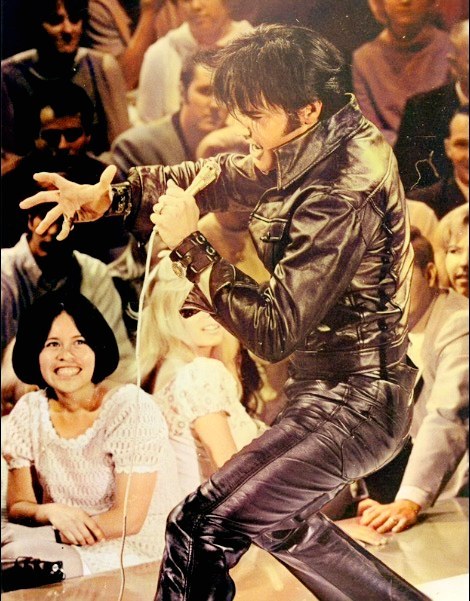For Elvis Presley fans, Netflix’s documentary Return of the King: The Fall & Rise of Elvis Presley offers an intimate look at one of music history’s defining moments: the 1968 NBC Comeback Special. More than just a TV event, it was a night of reinvention that revived Elvis’s career, solidified his legacy, and gave the world one of rock’s most iconic images—the all-black leather suit.
By the mid-1960s, Elvis Presley’s star had waned. Once celebrated as the rebellious force shaking the foundations of popular music, the King of Rock and Roll had been trapped in Hollywood’s cookie-cutter musicals. Instead of gritty, groundbreaking roles like James Dean or Marlon Brando, Elvis was handed forgettable scripts, performing novelty songs like Old MacDonald Had a Farm in films such as Double Trouble.
“That, to me, is a crime,” Priscilla Presley reflects in the documentary, her voice heavy with emotion. “It made him a laughingstock. And he knew it.”
Director Jason Hehir, who helmed the documentary, explains that the endless string of uninspired films left Elvis deeply frustrated. “He became physically ill at the thought of doing another bad movie,” Hehir says. “He wanted out. He wanted music again.”
Returning to music, however, was not simple. Elvis hadn’t performed live in seven years, and the idea of stepping in front of an audience terrified him. Hehir reveals that before the special, Elvis almost refused to leave his dressing room. “He had stage fright, even from the very start of his career. But once he was on stage, he transformed. He became the most comfortable man in the world.”
That night, Elvis wasn’t just performing—he was reclaiming his throne.
The performance is remembered not only for its raw energy but also for the look that defined it. The black leather outfit became a symbol of rebellion, charisma, and artistic resurrection. Yet the suit almost never existed. Inspired by a photograph of Elvis on a Harley Davidson, dressed in leather like Marlon Brando in The Wild One, producer Steve Binder encouraged costume designer Bill Belew to bring the image to life. Belew created a custom, high-collared leather suit that was both retro and cutting-edge.
Under the blazing stage lights, Elvis perspired through the set, yet the suit amplified his presence rather than diminished it. Every movement, every note reinforced the message: the King had returned.
The impact was immediate. The special drew massive viewership, and the soundtrack climbed into Billboard’s Top 10. Elvis, once a fading star trapped in second-rate films, was now the voice of a generation once again. “Those screaming teenage girls from the 1950s were now mothers. And yet, he still had them in the palm of his hand,” Hehir notes.
From that night on, Elvis’s career pivoted. Hollywood had failed to deliver the roles he dreamed of, but music restored his artistry and dignity. The 1968 special proved that his talent had not been diminished by years of neglect. Instead, it reminded the world of the electrifying performer who first shook America in the 1950s.
Priscilla Presley describes it as a rebirth. “That was the real Elvis,” she says. “Raw, powerful, and connected to the music.”
The black leather suit became more than clothing—it became a symbol of rebellion and renewal. Like Brando’s biker jacket in The Wild One, it represented defiance and independence, but with a personal twist: it was about rediscovering himself, not playing a role.
The comeback’s success reenergized Elvis’s career, leading to sold-out tours and legendary Las Vegas performances. Hollywood never gave him the legacy roles he longed for, but on stage, he reclaimed his throne, commanding audiences with unmatched voice and presence.
Nearly five decades after his death, the 1968 comeback stands as a testament to resilience. It showed that true talent, even when underestimated, cannot be buried forever. For Elvis, that night was more than a television special—it was a resurrection.
The leather suit endures as more than a fashion statement. It symbolizes an artist who refused to be forgotten, who fought through fear and doubt, and who reminded the world why he was the King.
Elvis Presley’s story, seen through the lens of that iconic night, is a reminder that legends don’t fade. They stumble, they fall—but they rise again, stronger, sharper, and unforgettable.
